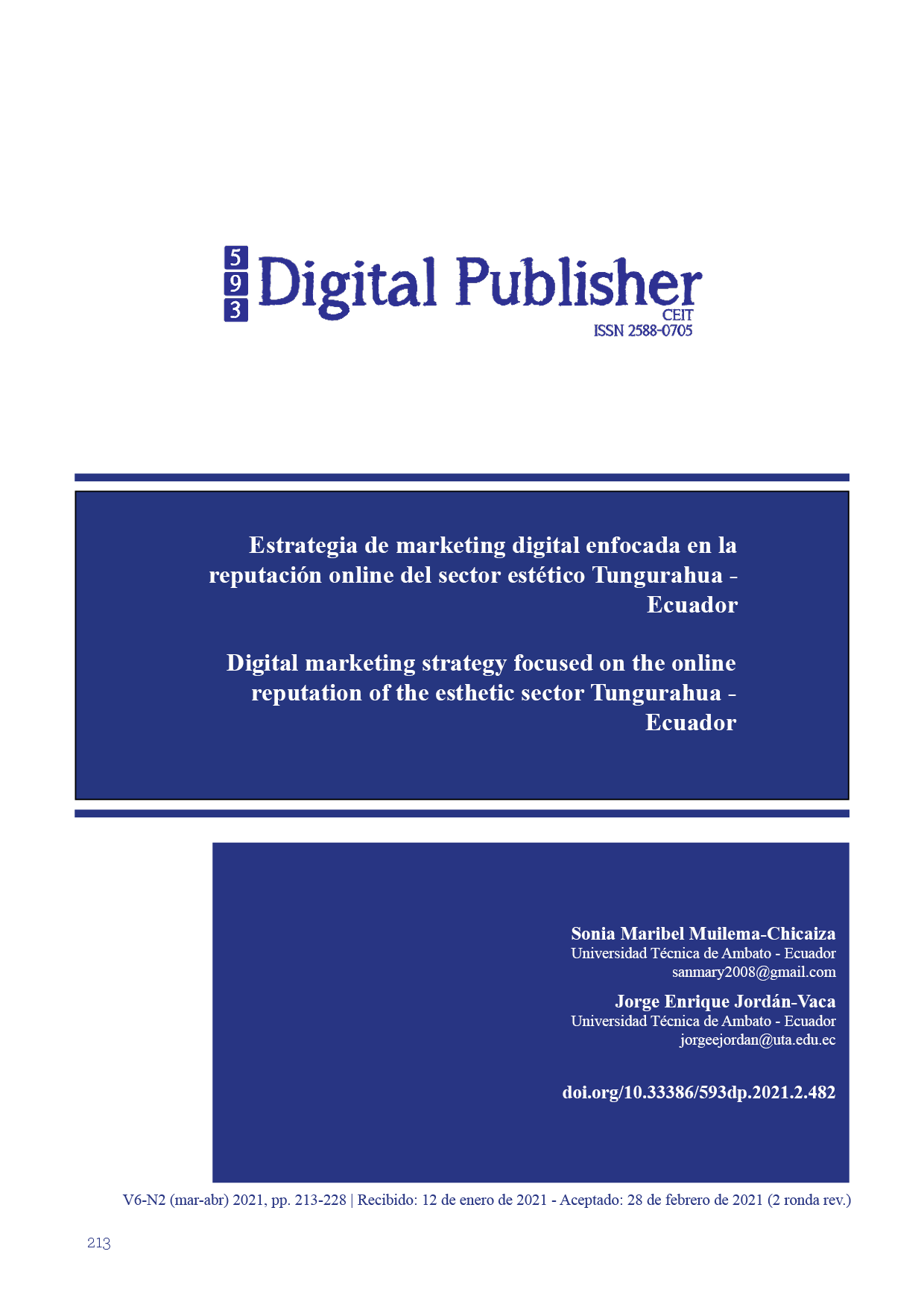Digital marketing strategy focused on the online reputation of the esthetic sector Tungurahua - Ecuador
Main Article Content
Abstract
The evolution of ICTs and COVID-19 times have generated consequences in all areas because the customer is increasingly demanding, looking for a product and / or service according to the needs. That is why the objective of this research is to determine a digital marketing strategy focused on the online reputation of the esthetic sector Tungurahua - Ecuador. In this sense, the problem identified is that companies in this sector are unaware of strategies and apply it empirically, without any analysis, evaluation, monitoring and control. To this end, documents in Spanish and English indexed in databases such as Springer Journal, Google Academic, Microsoft Academic Search and Journal Marketing were reviewed, which allowed to support the object of study and reach the conclusions. The instrument (survey) with a reliability index of 0.98 then allowed the collection and analysis of the data obtained on the object of study. Likewise, tools were used to analyze: social networks, website and online presence. Indeed, the results detail the stages of the strategy when considering the company DLU Hairdressing and Esthetics with a wide trajectory, variety of services and RRSS. Finally, the importance of this strategy and advantages such as: improvement of online presence, image and perception of customers is evident.
Downloads
Article Details

This work is licensed under a Creative Commons Attribution-NonCommercial-ShareAlike 4.0 International License.
1. Derechos de autor
Las obras que se publican en 593 Digital Publisher CEIT están sujetas a los siguientes términos:
1.1. 593 Digital Publisher CEIT, conserva los derechos patrimoniales (copyright) de las obras publicadas, favorece y permite la reutilización de las mismas bajo la licencia Licencia Creative Commons 4.0 de Reconocimiento-NoComercial-CompartirIgual 4.0, por lo cual se pueden copiar, usar, difundir, transmitir y exponer públicamente, siempre que:
1.1.a. Se cite la autoría y fuente original de su publicación (revista, editorial, URL).
1.1.b. No se usen para fines comerciales u onerosos.
1.1.c. Se mencione la existencia y especificaciones de esta licencia de uso.
References
Andrade, D. (2016). Estrategias de marketing digital en la promoción de Marca Ciudad. Revista EAN(80), 59-72.
Antón, E. (2018). Reputación corporativa online: beneficios para las empresas. España: Prestigia Online.
Ardila, Y., & Silva, M. (2016). Comunicación: reputación y crecimiento empresarial. Pensamiento y gestión(41), 194-239.
Balmer, J. (2019). Corporate marketing: Apocalypse, advent and epiphany. Management Decision, 47(4), 544 -572.
Benítez, L. (2016). Analysis of peer recommendations in the online reputation of organizations. El profesional de la información, 25(4), 652-660.
Berceruelo, B. (2017). Comunicación: soluciones para un mundo digital. Madrid, España: Estudio de Comunicación, S.A.
Carballo, C. (2018). Identidad digital: los efectos de los mensajes de RR.PP. traducidos en la era de la comunicación globalizada. El caso de Starbucks España y Starbucks UK. Razón y Palabra, 22(3), 179-214.
CCA. (2020). Cámara de Comercio de Ambato. Obtenido de http://www.cca.org.ec/index.php/guia-comercial
CIDH. (2020). Pandemia y Derechos Humanos en las Américas. España: Unsplash.
Climent, J., & Navarro, Y. (2017). Branding y reputación: pilares básicos de la visibilidad online del profesor de educación superior. Revista iberoamericana de educación superior, 8(21), 66-76.
Costa, M., Armijos, V., Loaiza, F., & Aguirre, G. (2018). Inversión en TICS en las empresas del Ecuador para el fortalecimiento de la gestión empresarial periodo de análisis 2012-2015. Espacios, 39(47), 1-12.
Del Fresno, M. (2017). El consumidor social: reputación online y social media. Barcelona: UOC.
Encuesta online. (01 de marzo de 2020). Google Drive. Obtenido de Formularios: https://docs.google.com/forms/d/1smP52AaaREWl2bRcRXFkgOyvBnsV1bljNSC-69KYluw/viewanalytics
Fanpage Karma. (2020). Obtenido de https://www.fanpagekarma.com/
Fernández, G. (2019). Introducción al marketing digital. España: Famet.
Floridi, L. (2015). How do information and communication technologies shape our Conditio humana? New York: Springer.
Francesc, J. (2018). Presencia y reputación online en social media: comparativa en el sector de la moda. Fonseca, Journal of Communication(5), 92-116.
García, J. (2016). Nuestro concepto de reputación. Madrid: Ciclos Computenses de Comunicación.
Gauchi, J., & Salas, I. (2019). La reputación corporativa como instrumento de articulación en la gestión de la organización. FISEC, 6, 37-59.
Gobierno Provincial. (2020). Centros de Estética y Belleza. Obtenido de http://rrnn.tungurahua.gob.ec/promocion/productos/get_by_categoria/5fa9634d83ba88c762fe5e33
Google Maps. (2020). Obtenido de https://www.google.com/maps/
He, H.‐W., & Balmer, J. (2015). The saliency and significance of generic identity: An explanatory study of UK building societies. The International Journal of Bank Marketing, 23(4), 334-348.
Hongwei, H., & Lloyd, H. (2020). The impact of Covid-19 pandemic on corporate social responsibility and marketing philosophy. Journal of Business Research, 116, 176-182.
Hoz, E., Martínez, O., Combita, H., & Hernández, H. (2019). Las tecnologías de la información y la comunicación y su influencia en la transformación de la educación superior en Colombia para impulso de la economía global. Información Tenológica, 30(1), 255-262.
Iglesias, D., & Santo, O. (2019). Reputación online para todos. España: SUM.
INEC. (2015). Instituto Nacional de Estadística y Censos. Obtenido de https://www.ecuadorencifras.gob.ec/wp-content/descargas/Presentaciones/resultados_generales_censo_economico.pdf
Jian, G., & Tao, Z. (2017). Evaluating user reputation in online rating systems via an iterative group-based ranking method. Physica A: Statistical Mechanics and its Applications, 473, 546-560.
Katz, R., Jung, J., & Callorda, F. (2020). El estado de la digitalización de América Latina frente a la pandemia del COVID-19. España: CAF.
Keyhole. (2020). Obtenido de https://keyhole.co/?utm_term=keyhole&utm_campaign&utm_source=adwords&utm_medium=ppc&hsa_tgt=kwd-301338585316&hsa_net=adwords&hsa_grp=68668108053&hsa_cam=1770405053&hsa_kw=keyhole&hsa_src=g&hsa_mt=e&hsa_ad=386671159086&hsa_ver=3&hsa_acc=1014888927&gclid=Cj
López, D. (2018). Reputación corporativa y visibilidad estratégica. Modelo de gestión de la reputación online y su aplicación en las empresas de Barcelona. España: UIC.
Madrigal, S., Moreno, F., & Juárez, B. (2020). Internet y redes sociales en la construcción de la reputación digital de la organización del sector turístico. Espacios, 41(14), 23-34.
Maestro, L., Cordón, D., & Abuín, N. (2018). La comunicación publicitaria en entornos digitales: herramientas para garantizar la reputación corporativa. Revista Prisma Social(22), 209-228.
Maldonado, C. (2019). La belleza en el Ecuadorse vende bien. Revista Gestión(233), 46-48.
Martínez, I., & Olmedo, I. (2019). La medición de la reputación empresarial: problemática y propuesta. Investigaciones Europeas de Dirección y Economía de la Empresa, 15(2), 127-142.
Medina, P. (2017). La gestión de la reputación online de las marcas hospitalarias: una propuesta de modelo. Revista de Estudios de Comunicación, 22(43), 53-68.
Mejía, N., & Villamar, L. (2017). Plan estratégico de marketing online para el Centro de Belleza Enith Lemos en la ciudad de Guayaquil. Guayaquil: Universidad de Guayaquil.
Metricspot. (2020). Obtenido de https://metricspot.com/
Mir, P. (2018). Reputación de marcas y social media. Pamplona: ECOE Ediciones.
Muñoz, I., González, E., & Beas, M. (2020). Retos educativos y sociales en tiempos de confinamiento. Educere, 25(80), 126-141.
Navarro, M., & Martínez, J. (2017). Estudio bibliométrico sobre reputación digital y economía colaborativa. Revista de Comunicación de la SEECI(51), 83-107.
OMS. (2019). Organización Mundial de la Salud. Obtenido de https://www.who.int/es/emergencies/diseases/novel-coronavirus-2019
Pérez, A., & Rodríguez, I. (2015). Identidad, imagen y reputación de la empresa: integración de propuestas teóricas para una gestión exitosa. Cuadernos de Gestión, 14(1), 97-126.
Quevedo, E., Fuente, J., & Delgado, J. (2015). Reputación corporativa y creación de valor. Investigaciones Europeas de Dirección y Economía de la Empresa, 11(2), 81-97.
Ruiz, B., Gutierrez, S., & Águeda, E. (2016). Desarrollo de un concepto de reputación corporativa adaptado a las necesidades de la gestión empresarial. Strategy & Management Business Review, 3(1), 9-31.
Salas, L., Acosta, M., & Jiménez, M. (2018). Importancia del marketing de atracción 2.0, en las pequeñas y medianas empresas de la ciudad de Guayaquil (Ecuador). Espacios, 39(18), 31-45.
Soultana, T. (2016). Quality management in tourism and hospitality: an exploratory study among tourism stakeholders. International Journal of Economic Practices and Theories, 2(2), 53-61.
SPSS. (30 de marzo de 2020). SPSS versión 18. Obtenido de https://drive.google.com/file/d/19zXmSrYxvmTljn1KopAn4r_XHfUR2f1l/view
Torres, C., & Lagunes, A. (2018). La gestion de la identidad digital y sus dimensiones. Innovación, Tecnología y Liderazgo(23), 423-442.
Velarde, S., & Pulido, M. (2018). Reputación corporativa y gestión de la comunicación. Estudios Institucionales, 5(9), 243-252.
Zhuo, W., & Qian, C. (2020). Monitoring online reviews for reputation fraud campaigns. Knowledge-Based Systems, 195, 605-685.



